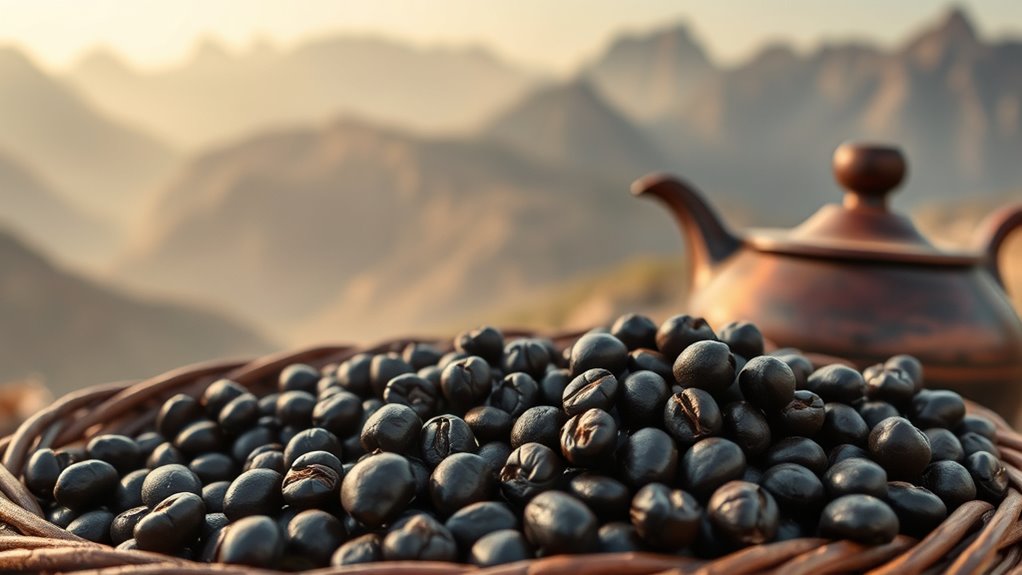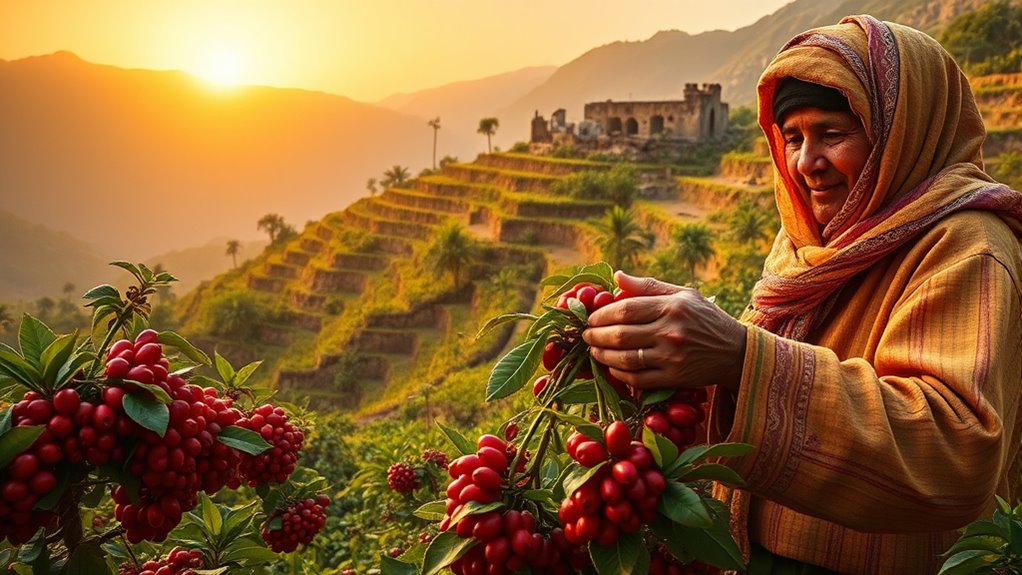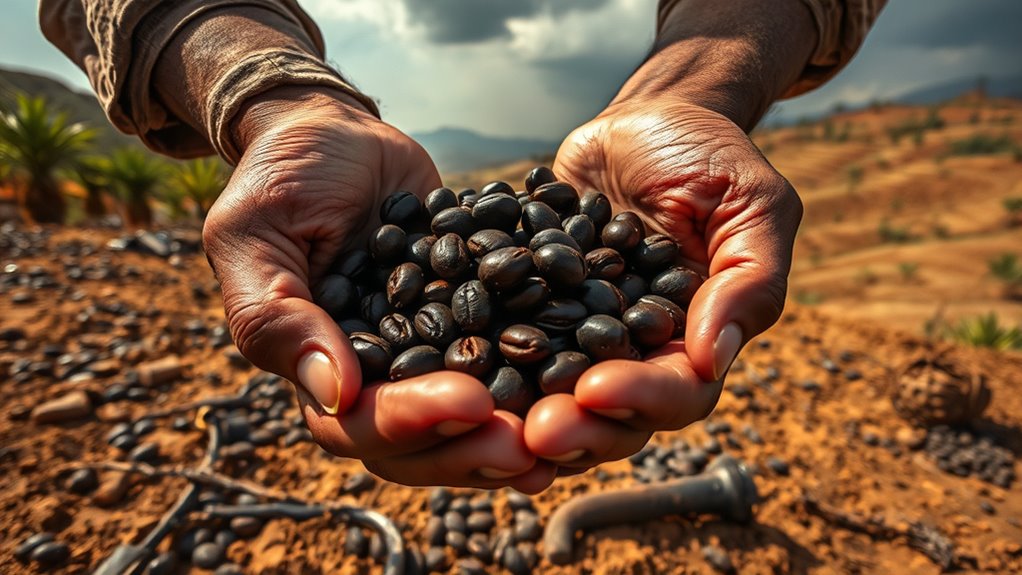Yemen coffee’s got a history cooler than a space llama! Originating from the 12th century, it’s got rich flavors that make your taste buds do a happy dance! Picture monks sipping this magic brew during spiritual journeys. Grown on small family farms, Yemeni coffee uses traditional techniques that add to its unique taste—earthy and fruity, just like a coffee hug! So, if you’re curious about its charm and challenges, stick around for the scoop!
At a Glance
- Yemen coffee is historically significant, originating from Yemen in the 12th century and discovered by Sufi mystic Sheikh Omar.
- It is known for unique flavor profiles, featuring fruity, wine-like notes with chocolatey and floral undertones, stemming from diverse genetics.
- Traditional cultivation practices involve small family farms using sustainable methods, with farmers hand-picking cherries from terraced plots.
- Unique processing techniques, such as dry-processing and solar drying, enhance the rich and earthy flavors of Yemen coffee.
- Supporting Yemen coffee production helps sustain local farmers, preserves traditional farming methods, and promotes ethical trade practices.
Historical Origins of Yemen Coffee

When you think of coffee, do you ever wonder where it all started? Well, grab your cup and settle in!
Yemeni legends tell fascinating stories, like that of Sheikh Omar, a Sufi mystic credited with discovering coffee brewing. Forget Ethiopia for a second; Yemen’s got the earliest records of coffee cultivation from the 12th century!
Imagine those monks sipping coffee during late-night prayers, fueling their spiritual journeys. This mystical drink quickly became central to social life, turning coffee into a beloved ritual. The rich flavors of coffee from Yemen are often compared to the finest Colombian coffee beans, showcasing a diverse range of taste profiles that have evolved over centuries.
The Role of Yemen in Coffee Genetics
Yemen’s role in coffee genetics is like the secret ingredient in your favorite recipe—essential yet often overlooked!
You mightn’t know it, but Yemen’s coffee holds a treasure trove of genetic diversity. It’s like a hidden gem in the coffee world, contributing to global resilience.
You see, most coffee we sip can trace its roots back to Yemen or Ethiopia. And guess what? Recent discoveries, like the “Yemenia” variety, show there’s even more to explore! In fact, Puerto Rican coffee showcases how diverse coffee genetics can lead to unique flavor profiles that reflect their origins.
Traditional Cultivation Practices

Ever wondered how that rich, flavorful cup of Yemeni coffee gets from tree to your mug?
It all starts on small family farms, where coffee is lovingly nurtured using sustainable practices.
Picture farmers hand-picking ripe cherries on terraced plots in the stunning Haraz Mountains.
These hardworking families produce around 250 pounds a year, ensuring every bean is exceptional.
The manual labor is no joke, but it’s also a labor of love.
Plus, they’ve been doing this for over 550 years!
Yemeni coffee is prized for its unique flavor profile, which is often attributed to its traditional cultivation practices.
Unique Processing Techniques of Yemeni Coffee
If you think all coffee is processed the same way, think again! Yemeni coffee processing is truly unique and fascinating. Here’s how it stands out:
- Traditional Dry-Processing: Coffee cherries are dried whole, keeping the skin intact—no fancy machines needed.
- Sun-Drying: On rooftops, the intense sun and altitude work their magic, making flavors deep and earthy.
- Haraaz Special Preparation: This modern twist uses raised beds for better air circulation, yielding a cleaner cup.
- Minimal Water Use: Yemeni coffee embraces solar drying, avoiding water-intensive methods. Additionally, this method results in rich flavors that are often sought after by coffee enthusiasts.
Flavor Profile and Characteristics

When you sip on a cup of Yemeni coffee, you’re not just tasting a drink—you’re enjoying a rich tapestry of flavors that tell a story.
You’ll notice the flavor evolution, from earthy and rustic to sweet notes of dried fruit and chocolate. The bright, wine-like acidity dances on your palate, while hints of cinnamon and cardamom add a spicy kick. Each sip feels full-bodied and satisfying, like a warm hug in a mug. Whether it’s the mocha vibes or the honeyed aromas, Yemeni coffee’s tasting notes are a delightful adventure you won’t want to miss! Additionally, many coffee enthusiasts enjoy pairing their coffee with non-dairy creamers to enhance its rich flavors.
Yemen’s Historical Coffee Trade and Market Decline
Yemen’s coffee trade has a fascinating history that’s as rich as the brew itself.
Once, Yemen ruled the coffee world, but things changed. Here’s a quick look at the decline of its market dominance:
- Dutch traders snuck out live coffee plants, starting a global coffee craze.
- New coffee colonies popped up, flooding the market and pushing Yemen aside.
- The fall of the Ottoman Empire shifted crucial trade routes away from Mocha.
- Political chaos in Yemen disrupted the beloved coffee cultivation.
Despite this, Yemen’s coffee remains special, connecting us to its vibrant past and unique flavors. Today, the best cafes in Los Angeles showcase various coffee styles, including Yemen’s unique offerings.
Challenges Facing Yemeni Coffee Production

While sipping that first cup of coffee in the morning, you mightn’t realize that the beans come from a place facing some serious challenges.
Yemen’s coffee farmers battle intense droughts and rising temperatures that wreak havoc on their crops. Plus, pesky pests are having a field day!
With poor roads, getting coffee to market can feel like a marathon, and farmers often get peanuts for their hard work. They need better climate adaptation strategies and pest management, but ongoing conflict makes it tough. Additionally, the unique flavor profile of low acid coffee can provide a market opportunity that supports sustainable farming practices in Yemen.
Cultural Significance of Coffee in Yemen
Coffee isn’t just a drink in Yemen; it’s the heartbeat of social life! When you sip a cup, you’re joining a rich tradition that brings people together.
Here’s why it matters:
- Traditional Gatherings: Coffee ceremonies are central to family and community events.
- Spiritual Rituals: Sufis used coffee to enhance their meditative practices.
- Respect and Hospitality: Offering coffee shows kindness and care.
- Cultural Identity: It’s a daily reminder of Yemen’s unique heritage. Additionally, coffee from Yemen is known for its distinctive flavor profiles, making it a sought-after experience for coffee enthusiasts around the world.
Economic Impact on Local Communities

In a place where coffee isn’t just a drink but a way of life, it’s no surprise that it has a massive impact on local communities in Yemen.
You see, coffee’s more than just tasty—it’s a lifeline. Farmers, many of them women, gain stable incomes and fair prices, thanks to community involvement.
Plus, with specialty coffee booming, there’s room for economic diversification! It’s like a coffee-powered superhero for families, giving them hope and income. Low acid organic coffee can also provide a healthier option for consumers, further boosting demand for this valuable crop.
And let’s be real, a strong cup of coffee can do wonders for morale, right?
The Future of Yemen Coffee in the Global Market
As the world wakes up to the rich flavors of Yemeni coffee, it’s clear that this beloved brew is on the brink of something big!
Here’s why you should keep an eye on Yemen coffee in the global market:
- Record auction prices reflect rising demand.
- Specialty coffee buyers are competing fiercely.
- Sustainable practices can boost production and quality.
- Unique genetic qualities make Yemen coffee a standout.
With market trends leaning towards quality and sustainability, Yemen coffee’s future looks bright. The importance of choosing the perfect water for brewing can enhance the unique flavors of this exceptional coffee.
Together, we can support this vibrant culture and enjoy those amazing flavors. Cheers to that!





